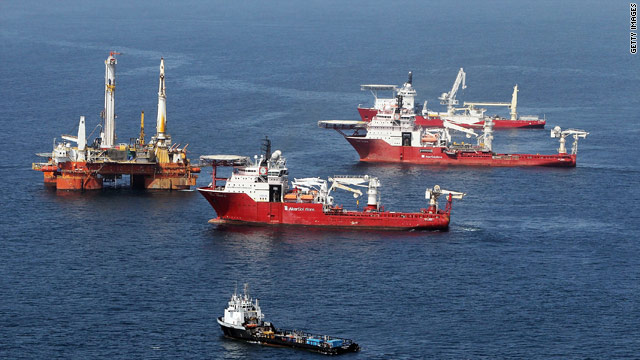 New Orleans, Louisiana (CNN) -- Bonnie went out with a whimper Saturday, sparing Gulf Coast residents new misery and allowing some of the vessels working on BP's ruptured oil well to return to the site.
New Orleans, Louisiana (CNN) -- Bonnie went out with a whimper Saturday, sparing Gulf Coast residents new misery and allowing some of the vessels working on BP's ruptured oil well to return to the site.
But with the hurricane season expected to get only busier, especially later in August, the move of ships to and from safer waters during a storm could be more problematic as crews try to kill the well and safeguard the site.
Ships critical for work on BP's well in the Gulf of Mexico started returning Saturday afternoon after the former tropical depression lost its punch.
The Development Driller III, the rig drilling the first relief well, returned to the well site off Louisiana. The drill ship Discoverer Enterprise was en route, as was the DDII, according to BP. All three are expected to be on site by Saturday night.
As of 4 p.m. (5 p.m. ET), Bonnie had been downgraded from a tropical depression. Maximum sustained winds were 30 mph.
The weather forced officials to temporarily scale back efforts to search beneath the surface for leaking oil and permanently plug the leak, officials said.
The Caribbean storm map behind Bonnie was empty Saturday night.
Ships were moved out of harm's way Friday due to the approaching storm. Most of the 10 to 15 vessels that were at the site will be back on the scene within 24 hours, retired U.S. Coast Guard Adm. Thad Allen told reporters.
But Allen and BP know there's a possibility that one or more of the 8-14 projected hurricanes this year could come when vessels are still out at the site.
The dicey weather in the region threatens the time it takes to erect a relief well and embark on the "static kill" process, which involves pumping mud into the ruptured well to force oil back into the reservoir below.
Allen said the static kill process could begin three to five days from now.
"We're going to be playing a cat-and-mouse game for the remainder of the hurricane season," Allen said.
BP crews working on a relief well are aware of the potential weather and want to have it completed by the first of August, CNN weather producer Judson Jones said Saturday evening.
"That's why they are eager to get [back] out there," he said.
Jones said an upper level low killed Bonnie, the second named storm of the season behind Hurricane Alex.
But storms born off Africa's Cape Verde will be stronger and will have more time to develop when they begin arriving in August and September, Jones said.
"Imagine what a Category 3 or Category 4 storm would do in the Gulf," Jones said.
Besides damaging the coastline, a strong hurricane could damage the well site. The time for vessels to flee and return would be longer, extending the massive project.
And there's another concern.
"If we get a storm ... things right under the surface could be brought on shore by storm surge," Jones said.
For now, the clear weather buys more time for skimmers and other boats recovering the oil and dispersants below the surface.
Federal officials are pleased with the state of the sealed well.
Allen said the monitoring of the well continued overnight Friday with remote-operated vehicles. The pressure was 6,891 pounds per square inch as of midnight.
"It's still good," he said.
The disaster was sparked when the Deepwater Horizon rig exploded April 20, leaving 11 workers dead. Oil flowed freely from the ruptured well for nearly three months, before a cap was installed on it July 12.



